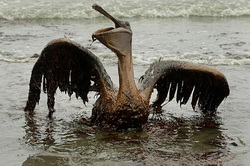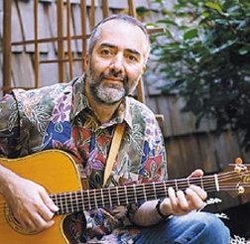
Being a leader is hard. "Leadership" is different from "management" - good leaders inspire, take risks and make strong stands, listen carefully, and surround themselves with wise people who will argue with them. They do not set out to prove themselves right... they work hard to do right, to do what is in the best interest of all. They do this in an inspirational way, looking deeply into their own vision as well as those of others, and moving creatively toward possibilities.
An effective leader does not do the expedient thing. While she listens carefully and considers others' ideas and hopes, she does not make difficult decisions primarily based upon whom she might please or displease in the moment. She has to hold the future in her mind and heart at the same time she is firmly rooted in today. There are times when short-term benefits might yield significant long-term costs.
Considering the future and thinking about the best interests of all - these are not simple perspectives to develop and promote, particularly in a culture driven by immediate gratification of individual needs and in a political system in which decisions rise and fall based on popularity stats and donated dollars.
So, a couple of things have come down the last couple of weeks, midst news of earthquakes, hurricanes, and tropical storms. A couple of important things, nationally and locally, that I hope we all think about.
First, under former Governor Rendell, Pennsylvania's government had been part of five federal environmental lawsuits supporting health protective regulations of greenhouse gas emissions and ground-level ozone, the primary component of smog. Under current Governor Corbett, the PA government has pulled out of these lawsuits. This is, unfortunately, consistent with the current administration's lack of action on another environmental front - there has been a failure to ensure that fracking and gas drilling along the Marcellus Shale area are safe activities, a failure to consider environmental safety issues impartially with the best interests of all in mind.
Second - and we will see that simple party affiliation seems not to matter - this from the New York Times...
President Obama abandoned a contentious new air pollution rule on Friday, buoying
business interests that had lobbied heavily against it, angering environmentalists who
called the move a betrayal and unnerving his own top environmental regulators.
It must be very difficult for Obama to juggle all of the needs presented to him, many of which he has inherited. I have no doubt that job growth is a high priority, that fixing the economy is important. At the same time, the sad -- oh so sad -- reality is that the least of us is hurt the most by a failure to give equal attention to the environment. Pollution of air and water is a social justice issue. Poor people are disproportionately exposed to pollutants that result in acute and chronic health problems. These are people who have the least power to effect change in the system - the least economic clout, the least access to high quality education and health care, the fewest opportunities to reverse trends that have plagued generations before them.
Our economy may be protected - may be - in the short-term by decreasing regulation of industry-related air pollution, but the long-term costs of ignoring environmental issues are huge - in terms of damage to physical and mental health, stunted education and job preparation, and economic instability. The costs to the viability and sustainability of our ecosystem are enormous.
Maybe Obama has a plan - I am hoping that his decision to back off air pollution regulations is truly just a delay, that he will get back to this very soon. I am hoping that he keeps environmental issues in a prominent place on his desktop.
I don't have easy answers obviously. But I do think about what makes good leadership and have a few thoughts gleaned from conversations with Michael and Julie this weekend...
- This semester, at Washington University, Julie is taking a Praxis course focusing on leadership. She related a class discussion about "energy" in leadership - and talked about how a leader must be aware of her own energy, up or down, positive or negative, and learn to manage it and to understand its sources. A leader must also be sensitive to the energy of her co-leaders and those she is leading -- must learn to "read" this energy accurately and to use this information in the leading and decision-making process.
When I try to put myself in Obama's shoes, I have a hard time imagining what it might feel like to carry as much responsibility as he does, what the nature of his work energy might be. Were I in his shoes, I suspect that, along with determination and hope, fear and uncertainty would be frequent visitors. Who among us doesn't often feel afraid and uncertain in these times? Our lack of ultimate control over weather and natural events has been evident in recent weeks -- and the same goes for our economic system. And yet... and yet. There are ways of living long-term -- most of which will admittedly require change and unfamiliar perspectives and experiences -- that can begin to shift these things a bit into a better direction.
Can a leader recognize fear and uncertainty when these feelings arise, in herself or in those around her? Can she understand how these feelings might affect her and her decision-making? A leader might fear making the wrong decision, letting people down, or not having enough information to really know the best decision. A strong leader must dig deep down into such uncertainty, then come back up to lead with clear-eyed strength and courage, avoiding compromises that are too, well, too compromising, avoiding paralysis. It must be hard - it must feel like Whack-A-Mole at Chuck E Cheese - you bop one problem down, and another two pop up - faster and faster.
I sense a different kind of fear among some industry leaders - a fear of a different future, in which power might be more equitably distributed. If this fear exists, one response is to do what is necessary to protect one's own power base. I might be wrong. I wish that I were wrong, that the vision of our leaders in government and industry extended well beyond themselves. Please tell me and show me that I am wrong.
- Michael has recently started his job at BCG, which, according to its web-site and Michael's comments, is a global management consulting firm and the world's leading advisor on business strategy. Michael does not give me any details about the projects he is working on - this information is confidential (and I secretly think he loves telling me that he can't tell me stuff). But he has talked with me about the processes involved in the projects. He describes working on a team of really really bright people from all over the world who are not afraid to ask difficult questions - indeed, asking as many challenging questions as you can before drawing conclusions or making any recommendations or decisions is required. According to Michael, the team goes into a project without assumptions, or at least aware of assumptions which they will then question. The team does not work in order to support or prove a particular hypothesis or to buttress a pre-existing vision of how someone wants things to work out. The goal is to think it through from all angles - first just deciding how the questioning process should itself be framed - and then to draw some initial conclusions. I can see that this process might need to be repeated many times as new information emerges.
Think again, think deeply, about what Rachel Carson said almost 50 years ago - The road we have long been traveling is deceptively easy, a smooth superhighway on which we progress with great speed, but at its end lies disaster. The other fork of the road -- the one less traveled by -- offers our last, our only chance to reach a destination that assures the preservation of the earth.
The other fork of the road does involve uncertainty and risk - it is, after all, less traveled and less familiar - but it also offers possibility. Possibility! What if? Can we? What if we were actually to step off that too easy, smooth superhighway? I dream of each of us driving, leading into a future of possibility in our own small but significant ways, in our own corner of the world.
Always remember that your own path, your own voice, matter. On the Resources page is information about how and where to communicate your ideas about what needs to be done.




 RSS Feed
RSS Feed
